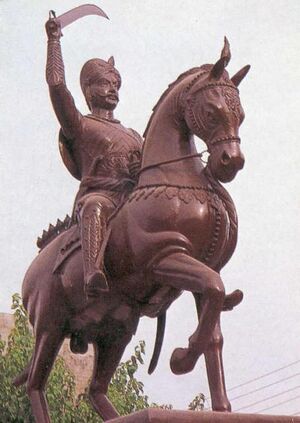Parmal: Difference between revisions
| Line 15: | Line 15: | ||
Later, the [[Chauhan]] King [[Prithvi Raj]] captured Mahoba despite the brave fight put up by the brothers, [[Alha]] and [[Udal]]. Other warriors of Mahoba, viz. [[Udal]], [[Brahma]], [[Malkhan]], [[Sulkhan]], [[Dheba]] and Tala Saiyyad, etc., laid down their lives in the battle. [[Parmala]] had to retreat to [[Kalinjar]] leaving Mahoba in the hands of the conqueror. [[Prithvi Raj]] appointed his Thanapati Pajjun Rai as his administrator. A few years later, he was driven out by Samarjeet, son of Parmala. This, however, could not stop the beginning of the end of Chandella rule. Two decades later, [[Qutubuddin Aibek]] vanquised Mahoba and [[Kalinjar]] in '''1203''' A.D. Aibk took away immense booty with thousands of artisans as prisoners. He deported most of them to [[Ghazni]] as slaves, who constructed beautiful buildings there. Later, Trailokya Verman, another son of Parmala, recovered Mahoba and Kalinjar but the Chandellas lost their eminence. Mahoba lost its independence and became part of the Delhi Sultanate. | Later, the [[Chauhan]] King [[Prithvi Raj]] captured Mahoba despite the brave fight put up by the brothers, [[Alha]] and [[Udal]]. Other warriors of Mahoba, viz. [[Udal]], [[Brahma]], [[Malkhan]], [[Sulkhan]], [[Dheba]] and Tala Saiyyad, etc., laid down their lives in the battle. [[Parmala]] had to retreat to [[Kalinjar]] leaving Mahoba in the hands of the conqueror. [[Prithvi Raj]] appointed his Thanapati Pajjun Rai as his administrator. A few years later, he was driven out by Samarjeet, son of Parmala. This, however, could not stop the beginning of the end of Chandella rule. Two decades later, [[Qutubuddin Aibek]] vanquised Mahoba and [[Kalinjar]] in '''1203''' A.D. Aibk took away immense booty with thousands of artisans as prisoners. He deported most of them to [[Ghazni]] as slaves, who constructed beautiful buildings there. Later, Trailokya Verman, another son of Parmala, recovered Mahoba and Kalinjar but the Chandellas lost their eminence. Mahoba lost its independence and became part of the Delhi Sultanate. | ||
== External links == | |||
== References == | == References == | ||
<references/> | <references/> | ||
[[Category:General History]] | [[Category:General History]] | ||
Revision as of 08:00, 9 April 2015

Parmal/Parmala (परमाल) or Parimal or Raja Parmal or Parmardi-deva or Maharaj Parimard Dev Burman was the last Chandel King of Mahoba in 12th-13th century AD.
Alha - Udal
Udal was a general in the army of Chandel King Maharaj Parimard Dev Burman (also known as Parmal or Parimal) of Mahoba in 12th-13th century AD. He was younger brother of Alha. Parmal raised Udal as his own son, since he was born after the death of his father Dassraj, who - a general himself - was killed in the service of Parmal.[1]
Udal was generally seen on a horse whereas Alha, on an elephant. Both are among the greatest warriors of Mahoba of all times. Out of total 52 battles fought by these, Udal alone had won 22 battles. Alha and Udal chowk is now situated in Mahoba city. A grand statue of Udal has also been established there.
It is believed that both these brothers had built so many structures and temples in Mahoba district.
Fall of Raja Parmal
The last prominent Chandel ruler was Parmardi-deva or Parmal whose name is still popular due to the heroic deeds of his two Generals Alha and Udala who own many battles. The court poet Jagnik Rao has made their names immortal through his popular ballad (Veer-Kavya) 'Alha-Khand'. It is recited throughout the Hindi speaking masses in the country. In 1860 AD an English Officer of the East India Company, Mr. William Waterfield was so impressed with the ballad that he translated it into English under the title name of 'Lay of Alha' which was published by the Oxford University Press of England. Another prominent scripture which has an account of Mahoba's grandeur is the Jain text 'Prabhandh-kosh' which refers to its magnificence which could only be realized and not described.
The reign of Parmardi-deva or Parmal, the Fifteen ruler of the dynasty, witnessed the fall of Mahoba. In 1182 A.D.differences arose between Parmala and Delhi king Prithviraj who gave an ultimatum lying certain conditions to be fulfilled by Parmala or to surrender. He made seize of Mahoba and his General Chaumund Rai even made a surprise attack on the Kajli procession of queen Malhna who hadgone to Keerat Sagar tank to offer Kajli Pooja on the Raksha-Bandhan day. A grim fight ensued in which Mahoba warriors:Udala, Brahma, Ranjeet, and Abhai (son of Mahila) repulsed the attack and Chaumund-Rai had to flee to his base camp at Pachpahara. The Kajli-Pooja was consequently celebrated the next day and that tradition continues to be followed even to this date. The third day is observed as a Victory Day and a thanks-giving Pooja is performed to Lord Shiva, Gajantak Shiva idol on Gokhar hill.
Later, the Chauhan King Prithvi Raj captured Mahoba despite the brave fight put up by the brothers, Alha and Udal. Other warriors of Mahoba, viz. Udal, Brahma, Malkhan, Sulkhan, Dheba and Tala Saiyyad, etc., laid down their lives in the battle. Parmala had to retreat to Kalinjar leaving Mahoba in the hands of the conqueror. Prithvi Raj appointed his Thanapati Pajjun Rai as his administrator. A few years later, he was driven out by Samarjeet, son of Parmala. This, however, could not stop the beginning of the end of Chandella rule. Two decades later, Qutubuddin Aibek vanquised Mahoba and Kalinjar in 1203 A.D. Aibk took away immense booty with thousands of artisans as prisoners. He deported most of them to Ghazni as slaves, who constructed beautiful buildings there. Later, Trailokya Verman, another son of Parmala, recovered Mahoba and Kalinjar but the Chandellas lost their eminence. Mahoba lost its independence and became part of the Delhi Sultanate.
External links
References
- ↑ Mishra, Pt. Lalita Prasad (2007). Alhakhand (in Hindi) (15 ed.). Post Box 85 Lucknow (India): Tejkumar Book Depot (Pvt) Ltd. pp. 1–11 (History of Mahoba).

